外研版(2019)高中英语必修第一册 A new start单元语法详解课件(二)(17张)
文档属性
| 名称 | 外研版(2019)高中英语必修第一册 A new start单元语法详解课件(二)(17张) |  | |
| 格式 | pptx | ||
| 文件大小 | 1.3MB | ||
| 资源类型 | 教案 | ||
| 版本资源 | 外研版(2019) | ||
| 科目 | 英语 | ||
| 更新时间 | 2023-02-25 21:09:35 | ||
图片预览


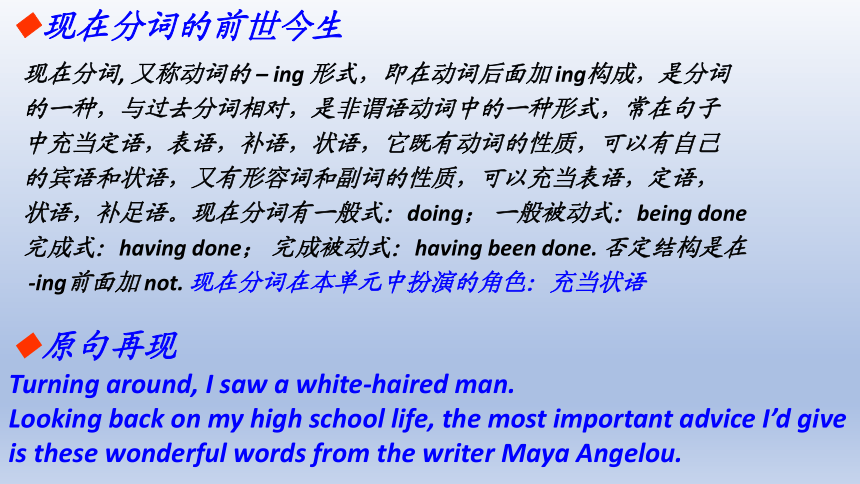
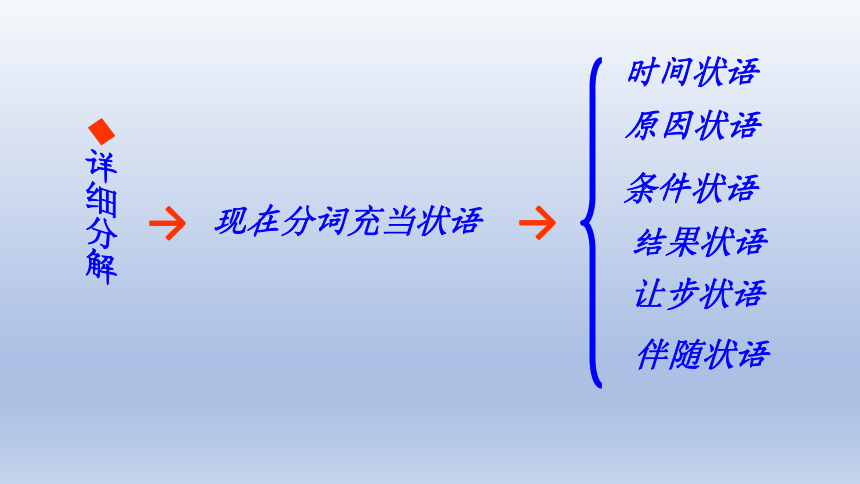
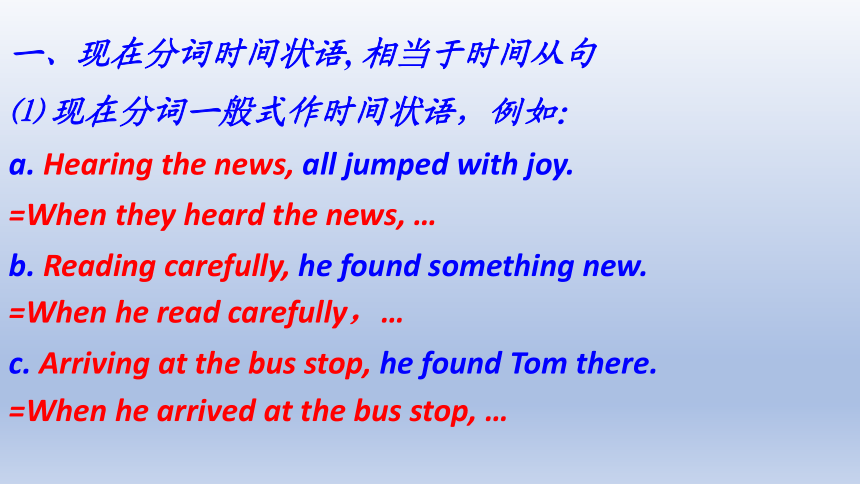
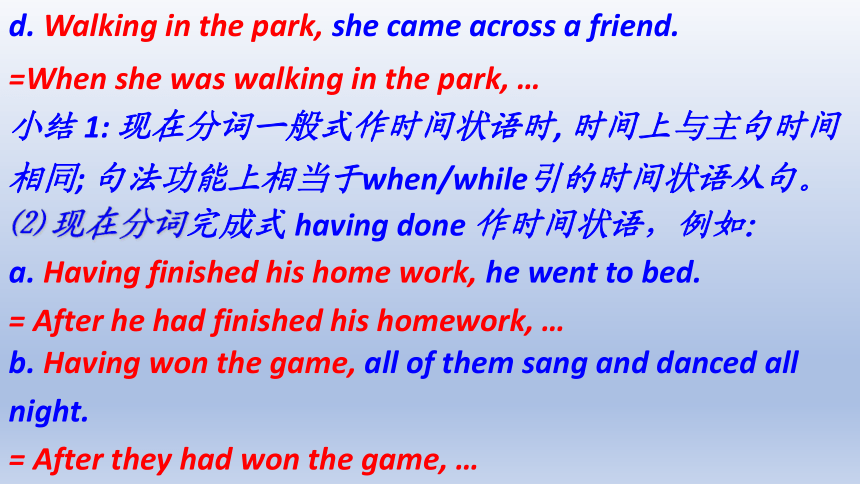
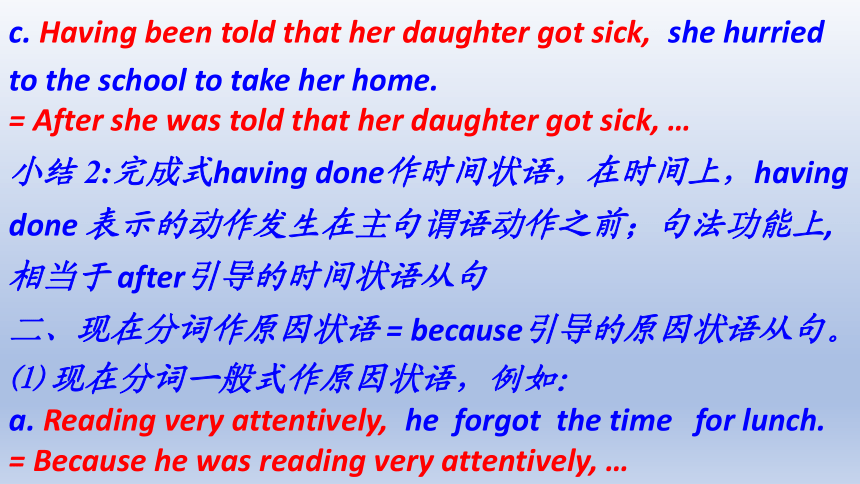
文档简介
(共17张PPT)
Unit1 A New Start
单元语法详解(二)
现在分词作状语
◆现在分词的前世今生
现在分词, 又称动词的 – ing 形式,即在动词后面加 ing构成,是分词
的一种,与过去分词相对,是非谓语动词中的一种形式,常在句子
中充当定语,表语,补语,状语,它既有动词的性质,可以有自己
的宾语和状语,又有形容词和副词的性质,可以充当表语,定语,
状语,补足语。现在分词有一般式:doing; 一般被动式:being done
完成式:having done; 完成被动式:having been done. 否定结构是在
-ing前面加 not. 现在分词在本单元中扮演的角色:充当状语
◆原句再现
Turning around, I saw a white-haired man.
Looking back on my high school life, the most important advice I’d give
is these wonderful words from the writer Maya Angelou.
◆详细分解
时间状语
原因状语
条件状语
结果状语
让步状语
伴随状语
现在分词充当状语
→
→
一、现在分词时间状语, 相当于时间从句
⑴ 现在分词一般式作时间状语,例如:
a. Hearing the news, all jumped with joy.
=When they heard the news, …
b. Reading carefully, he found something new.
=When he read carefully,…
c. Arriving at the bus stop, he found Tom there.
=When he arrived at the bus stop, …
d. Walking in the park, she came across a friend.
=When she was walking in the park, …
小结 1: 现在分词一般式作时间状语时, 时间上与主句时间相同; 句法功能上相当于when/while引的时间状语从句。
⑵ 现在分词完成式 having done 作时间状语,例如:
a. Having finished his home work, he went to bed.
= After he had finished his homework, …
b. Having won the game, all of them sang and danced all night.
= After they had won the game, …
c. Having been told that her daughter got sick, she hurried to the school to take her home.
= After she was told that her daughter got sick, …
小结 2:完成式having done作时间状语,在时间上,having done 表示的动作发生在主句谓语动作之前;句法功能上,相当于 after引导的时间状语从句
二、现在分词作原因状语 = because引导的原因状语从句。
⑴ 现在分词一般式作原因状语,例如:
a. Reading very attentively, he forgot the time for lunch.
= Because he was reading very attentively, …
b. Being ill yesterday, he didn’t come to school.
=because he was ill yesterday, …
c. Not knowing her address, he went to ask for help.
= Because he didn’t know her address, …
⑵ 现在分词完成式 having done 作原因状语, 例如:
a. Having lived in the country for many years, she knows how to grow vegetables.
=Because she has lived in the country for years, …
b. Not having received any news for a long time, she is becoming more and more homesick.
= Because she has not received any news form home for a long time, …
小结 3:现在分词作原因状语, 相当于一个原因状语从句;根据时间关系使用一般式或完成式。
三、现在分词作条件状语,等于 if 引导的条件状语句,例如:
a. Turning to the left, you will find him.
= If you turn to the left, …
b. Reading carefully, you will learn sth. new.
= If you read carefully, …
四、现在分词作结果状语,表示由前面的情况导致的结果或后果,例如:
a. The bus was caught in a snowstorm, thus causing the delay.
b. The man drank up the water, leaving an empty bottle.
c. he left half way, making us unhappy.
五、现在分词作让步状语 = 让步状语从句,例如:
a. Being ill, he kept on going to school as usual.
= Though he was ill, …
b. Having met the word for times, I don’t know it.
= Though I have met the word for times, …
c. Having been told many times, I still couldn’t understand it.
= Though I have been told many times, …
六、现在分词作伴随状语或方式状语,相当于并列谓语动词, 例如:
a. They walked along the street, talking and laughing.
b. They stood by the roadside talking about the plan.
c. She sat at the window, reading the latest news.
d. She came to us, running very quickly.
=The walked along the street, talked and laughed
=They stood by the roadside and talked about the plan
=She sat the window and read the latest news
=She came to us and ran very quickly
e. Following a guide, we started to climb the hill.
=We followed a guide and started to climb the hill
考点感悟
①现在分词的否定形式:Not + doing/ having done
a. Not having received any news for a long time, she is becoming more and more homesick.
b. Not knowing her address, he went to ask for help.
②注意时间关系:如果动作发生在主句动作之前,现在分词就用 完成式having done;如果动作与主句动作同时发生或在主句动作之后发生,现在分词就用一般式 doing,例如:
a. Hearing the news, all jumped with joy.
b. Having finished his home work, he went to bed.
③抓住主被动关系:看 现在分词和主语是主谓关系还是动宾关系,如果是主谓关系就用主动,动宾关系就用被动,例如:
a. Having been told many times, I still couldn’t understand it.
b. Having finished his home work, he went to bed.
④时刻注意现在分词逻辑主语 和主句主语一致,例如:
a. Reading carefully, he found sth new.
=When he read carefully, he…
b. Being ill yesterday, he didn’t come to school
= because he was ill yesterday, he…
◆即学即练
1. __________ (rise) from the east, the sun looks big and beautiful.
2. ___________ (last) two hours, the meeting ended finally.
3. ______________ (realise) that he was wrong, he apologized at once.
4. ________________ (tell) the good news before, he was not excited.
5.The old sat under a tree, _________(think).
6. ________ (be) ill, the scientist kept on working.
在空白处填入括号内单词的适当形式
Rising
Lasting
Having realised
Having been told
thinking
Being
7. They left half way, _________ (make) me confused.
8. ________ (turn) to the right, you will find a bookstore.
9. ____________ (live) in the country for five years, they
know a lot of villagers.
10. ________ (leave) very attentively, she forgot to lock
the door.
making
Turning
Having lived
Leaving
Unit1 A New Start
单元语法详解(二)
现在分词作状语
◆现在分词的前世今生
现在分词, 又称动词的 – ing 形式,即在动词后面加 ing构成,是分词
的一种,与过去分词相对,是非谓语动词中的一种形式,常在句子
中充当定语,表语,补语,状语,它既有动词的性质,可以有自己
的宾语和状语,又有形容词和副词的性质,可以充当表语,定语,
状语,补足语。现在分词有一般式:doing; 一般被动式:being done
完成式:having done; 完成被动式:having been done. 否定结构是在
-ing前面加 not. 现在分词在本单元中扮演的角色:充当状语
◆原句再现
Turning around, I saw a white-haired man.
Looking back on my high school life, the most important advice I’d give
is these wonderful words from the writer Maya Angelou.
◆详细分解
时间状语
原因状语
条件状语
结果状语
让步状语
伴随状语
现在分词充当状语
→
→
一、现在分词时间状语, 相当于时间从句
⑴ 现在分词一般式作时间状语,例如:
a. Hearing the news, all jumped with joy.
=When they heard the news, …
b. Reading carefully, he found something new.
=When he read carefully,…
c. Arriving at the bus stop, he found Tom there.
=When he arrived at the bus stop, …
d. Walking in the park, she came across a friend.
=When she was walking in the park, …
小结 1: 现在分词一般式作时间状语时, 时间上与主句时间相同; 句法功能上相当于when/while引的时间状语从句。
⑵ 现在分词完成式 having done 作时间状语,例如:
a. Having finished his home work, he went to bed.
= After he had finished his homework, …
b. Having won the game, all of them sang and danced all night.
= After they had won the game, …
c. Having been told that her daughter got sick, she hurried to the school to take her home.
= After she was told that her daughter got sick, …
小结 2:完成式having done作时间状语,在时间上,having done 表示的动作发生在主句谓语动作之前;句法功能上,相当于 after引导的时间状语从句
二、现在分词作原因状语 = because引导的原因状语从句。
⑴ 现在分词一般式作原因状语,例如:
a. Reading very attentively, he forgot the time for lunch.
= Because he was reading very attentively, …
b. Being ill yesterday, he didn’t come to school.
=because he was ill yesterday, …
c. Not knowing her address, he went to ask for help.
= Because he didn’t know her address, …
⑵ 现在分词完成式 having done 作原因状语, 例如:
a. Having lived in the country for many years, she knows how to grow vegetables.
=Because she has lived in the country for years, …
b. Not having received any news for a long time, she is becoming more and more homesick.
= Because she has not received any news form home for a long time, …
小结 3:现在分词作原因状语, 相当于一个原因状语从句;根据时间关系使用一般式或完成式。
三、现在分词作条件状语,等于 if 引导的条件状语句,例如:
a. Turning to the left, you will find him.
= If you turn to the left, …
b. Reading carefully, you will learn sth. new.
= If you read carefully, …
四、现在分词作结果状语,表示由前面的情况导致的结果或后果,例如:
a. The bus was caught in a snowstorm, thus causing the delay.
b. The man drank up the water, leaving an empty bottle.
c. he left half way, making us unhappy.
五、现在分词作让步状语 = 让步状语从句,例如:
a. Being ill, he kept on going to school as usual.
= Though he was ill, …
b. Having met the word for times, I don’t know it.
= Though I have met the word for times, …
c. Having been told many times, I still couldn’t understand it.
= Though I have been told many times, …
六、现在分词作伴随状语或方式状语,相当于并列谓语动词, 例如:
a. They walked along the street, talking and laughing.
b. They stood by the roadside talking about the plan.
c. She sat at the window, reading the latest news.
d. She came to us, running very quickly.
=The walked along the street, talked and laughed
=They stood by the roadside and talked about the plan
=She sat the window and read the latest news
=She came to us and ran very quickly
e. Following a guide, we started to climb the hill.
=We followed a guide and started to climb the hill
考点感悟
①现在分词的否定形式:Not + doing/ having done
a. Not having received any news for a long time, she is becoming more and more homesick.
b. Not knowing her address, he went to ask for help.
②注意时间关系:如果动作发生在主句动作之前,现在分词就用 完成式having done;如果动作与主句动作同时发生或在主句动作之后发生,现在分词就用一般式 doing,例如:
a. Hearing the news, all jumped with joy.
b. Having finished his home work, he went to bed.
③抓住主被动关系:看 现在分词和主语是主谓关系还是动宾关系,如果是主谓关系就用主动,动宾关系就用被动,例如:
a. Having been told many times, I still couldn’t understand it.
b. Having finished his home work, he went to bed.
④时刻注意现在分词逻辑主语 和主句主语一致,例如:
a. Reading carefully, he found sth new.
=When he read carefully, he…
b. Being ill yesterday, he didn’t come to school
= because he was ill yesterday, he…
◆即学即练
1. __________ (rise) from the east, the sun looks big and beautiful.
2. ___________ (last) two hours, the meeting ended finally.
3. ______________ (realise) that he was wrong, he apologized at once.
4. ________________ (tell) the good news before, he was not excited.
5.The old sat under a tree, _________(think).
6. ________ (be) ill, the scientist kept on working.
在空白处填入括号内单词的适当形式
Rising
Lasting
Having realised
Having been told
thinking
Being
7. They left half way, _________ (make) me confused.
8. ________ (turn) to the right, you will find a bookstore.
9. ____________ (live) in the country for five years, they
know a lot of villagers.
10. ________ (leave) very attentively, she forgot to lock
the door.
making
Turning
Having lived
Leaving
